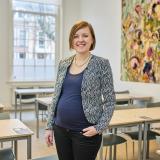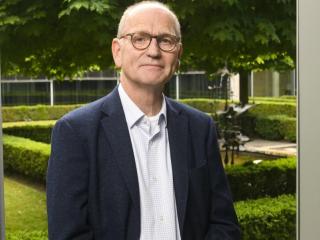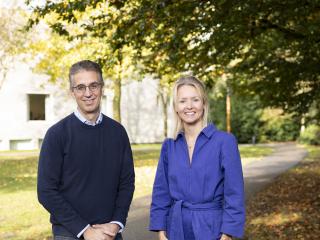Teacher of the Year Anke Liefbroer: In Lifelong learning, work and learning are not separate things
Even after your studies, you will never stop learning. Our lecturers are happy to give you tips on how to deepen your knowledge. Anke Liefbroer, an Associate Professor of Religious Psychology and Spiritual Care at Tilburg University, was voted Teacher of the Year 2023. In her teaching, she connects theory and insights from research with the practical aspects of spiritual caregivers. Her advice for ‘lifelong learning’ is to view work and learning as inseparable and to forge a stronger connection between them. She highlights three approaches.
-

dr. Anke Liefbroer
Associate Professor of Religious Psychology and Spiritual CareStudying for lifelong working
"I went to college right after high school. Like most of my fellow students, I was in my early twenties when I graduated. We all started by gaining a lot of theoretical knowledge. While I found this interesting, it was not always clear to me what I would gain from it in practice. At the time, I also had little idea of what it would be like to work in practice. In the last six months of the Master's program, some people, including myself, did internships for several months. We hoped to land a job in this way after graduation.
Many people do not get a good understanding of the practical application until after college, despite the theory having been covered long ago. I think of three ways you could narrow this gap between theory and practice."
Show the practical application of theoretical knowledge
"When I teach, I regularly use practical examples to illustrate theoretical concepts and demonstrate their practical application or how they help you understand a situation better. Alternatively, I show how I, or fellow researchers, try to address challenges that arise in practice through research. It helps that some of my teaching takes place within Master's programs that last two or three years. In the three-year Master’s program of Theology, and in the new two-year Master’s in Spiritual Care, students complete an internship in their second year. In a course running concurrently with this internship, I encourage students to come up with their own cases and apply the theory to them. In this way, I try to make an even more concrete connection between the theoretical knowledge students gain in the program and the practical application of it in real-world work settings."
Learning and conducting research while working
"Much of my research focuses on the field of spiritual caregiving. Spiritual caregivers are professionals who provide guidance on matters of meaning and life philosophy, for instance, in hospitals, to the military, or in penitentiary settings. In recent years, there has been a growing emphasis in this field on research conducted within and stemming from practice. For instance, the Case Studies Project engaged over 60 spiritual care workers who, in a structured manner, documented a case from their own practice and shared insights in groups. This project made them researchers in the field of spiritual caregiving. In his PhD research, my colleague Niels den Toom demonstrated how this type of research contributes to the articulation of people’s professional identity and the theoretical foundations of their work. I think this project is a good example of how, once you are working, you can continue to learn and evolve while simultaneously contributing to the development of theory through research."
I also notice with professionals who come to take postgraduate courses how they connect their own work experience with theory
Never too old to learn
"A third approach to bridging the gap between theory and practice is illustrated by my students. Many of them start their theology studies later in life, aspiring to become spiritual caregivers, philosophy of life teachers, pastoral workers, or simply because they want to delve into something new. Their work experience enriches the educational environment, allowing them to provide practical examples and offer their (often younger) fellow students a clearer understanding of what it is like on the work floor. I also notice with professionals who come to take postgraduate courses how they connect their own work experience with theory. In these courses, they learn new theories to interpret their experiences and enhance their practical skills."
Date of publication: 3 January 2024



